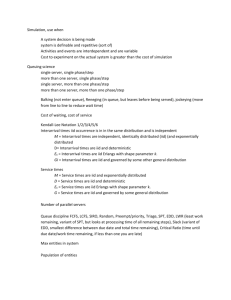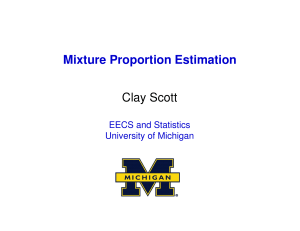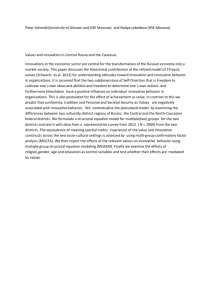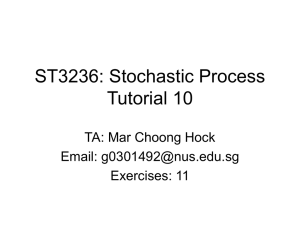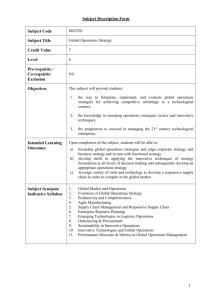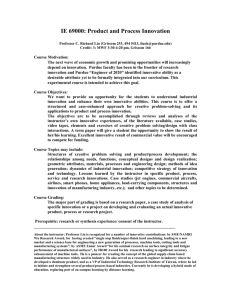Project «Vacuum Cleaner»
advertisement
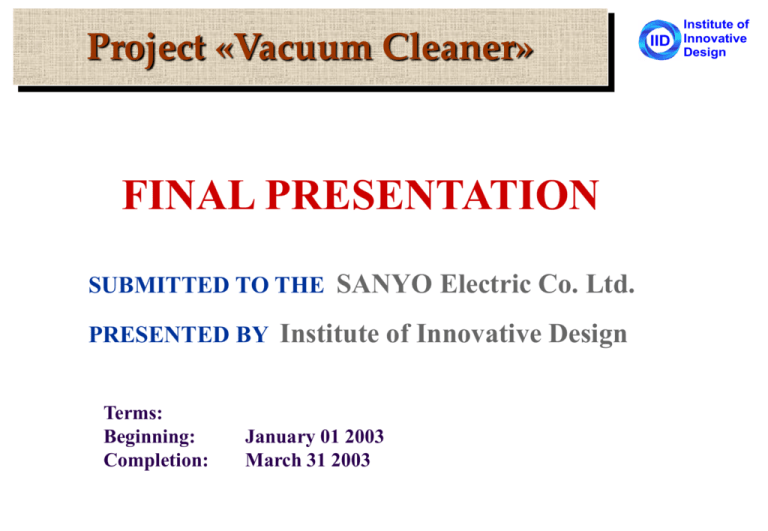
Project «Vacuum Cleaner» FINAL PRESENTATION SUBMITTED TO THE SANYO Electric Co. Ltd. PRESENTED BY Institute of Innovative Design Terms: Beginning: Completion: January 01 2003 March 31 2003 IID Institute of Innovative Design Object of Analysis Vacuum cleaner SC-JT8D IID Institute of Innovative Design Main Function To capture and to move dust by airflow. IID Institute of Innovative Design Project Goals IID Institute of Innovative Design Main Goal To develop the design of cleaning system that drastically reduce the distracting noise from 62 dB(A) to 49 db(A) or less by using TRIZ technology. Restrictions IID Institute of Innovative Design Desirable level of results of the project a degree of allowable changes of object: Level E. Forecasting - is not present any restrictions, down to replacement of the physical principle. Innovative Technology of Design Data Gathering Analysis of the Object Background information Functional and Flow models, Evolution Trends, Key Disadvantages, Contradictions IID Institute of Innovative Design Problem Statement Trimming problems, Feature transfer problems, Key problems Function Based Information Gathering ANALYTICAL STAGE Function oriented information Problem Solution Engineering Solutions Supporting Information Gathering Supporting information INFORMATION STAGE Concept substantiation Concepts, Ideas for Further Development CONCEPTUAL STAGE IID INFORMATION STAGE Institute of Innovative Design Processing Information IID Information stage Info 1 Source information Info 2 Scientific (basic) information Info 4 Support information Info 3 Functional information Analytical stage Conceptual stage Key problems Concepts Legend: Information reply Information request Institute of Innovative Design Information Search IID Types of Information Used INFORMATION Info 1 Info 2 Info 3 Info 4 INFORMATION SOURCE SCIENTIFIC (BASIC) INFORMATION FUNCTIONAL INFORMATION SUPPORTING INFORMATION INITIAL INFORMATION FROM CUSTOMER (DIAGRAMS, SAMPLES, ETC.) DATA OF COMPETITORS PRODUCTION BASIC SCIENTIFIC PRINCIPLES OF OBJECT ACTION (PHYSICAL, CHEMICAL, GEOMETRICAL, BIOLOGICAL) OBJECT EVOLUTION PARAMETERS CHARACTERIZING THE OBJECT AND ITS COMPONENTS LEADING AREAS OF ENGINEERING ENGINEERING DEVELOPMENTS AND THEIR COMPONENTS (EQUIPMENT, MATERIALS, ETC. I.E. DATA FOR FORMULATION OF FUNCTIONS) RESOURCES FOR STATED KEY PROBLEMS SOLVING INFORMATION ON SPECIFIC CONCEPTS SCIENTIFIC BASIS, CALCULATIONS REFERENCES Institute of Innovative Design Table of Information Search IID Institute of Innovative Design Fragment Search direction Leading fields of science and technology Principle, method, device 1. Technical function: To create airflow 1.1. Problem: High velocity of airflow forms turbulent motion. It is the cause of a noise. 1.1.1. Absorption sound by substance Fans Compressors Pumps Generalized technical function: Possible application to the project Mufflers To move substance To install muffler in body of vacuum cleaner. To make body double with soundproof material inside (or use vacuum). 2. Engineering function: To create airflow 2.1. Problem: Movers of gas generate discrete noise at the creation of movement of substance. Electronic engineering 2.1.2. Extinguishing of sound by antisound Acoustics Generalized engineering function: System of active noise control (electronic circuit) Helmholtz’s resonator To move substance To apply active noise control system in order to reduce noise. To apply Helmholtz’s resonators to extinguishing a sound with different frequencies. IID Analytical Stage Institute of Innovative Design Analytical Stage Structure OVERMODELING STATEMENT OF PROBLEMS COMPONENT - STRUCTURAL ANALYSIS IID Institute of Innovative Design DIRECTION OF SOLUTION GENETIC ANALYSIS FUNCTIONAL - PARAMETRIC ANALYSIS INTEGRATION OF ALTERNATIVE SYSTEMS PARAMETRIC ANALYSIS DIAGNOSTIC ANALYSIS CAUSE-AND-EFFECT CHAINS ANALYSIS Denotations: Undesirable effects STATEMENT OF KEY PROBLEMS Problems Component Structural Analysis Supersystem: Dust System: User Subsystem: Floor brush Ambient air Electric current Tube Dust collector Body Handle Filter of the motor protection Intake air windows Control panel Joint connector of Power cord reel Exhaust canal Exhaust outside hose Turbo-brush Bearings brush Control unit Sucking central hose Rollers Absorption filters of exhaust air Control wire turbo- Power cord Rotor Dust collector basket Joint Fan motor Fan case Exhaust canal of the pipe Brush Surface (floor) Vacuum cleaner Sucking canal of the pipe Floor brush case IID Institute of Innovative Design Sack Connector Holder Exhaust vents of the wheel Rotor blades Fan stator Case motor of electric Stator motor of electric Rotor motor of electric Ball bearings Collector Electric brush Braid Plug Electric wire Function Analysis Fragment of function table Element Turbo brush Sucking central hose Body Dust collector Rotor blades Function IID Institute of Innovative Design Rank To move dust B To generate discrete noise H To direct sucking airflow A1 To transmit aerodynamic noise H To transmit discrete noise H To direct exhaust airflow A3 To hold exhaust canal A4 To hold power cord reel A2 To direct sucking airflow A1 To transmit aerodynamic noise H To transmit mechanical noise H To collect dust B To decelerate sucking airflow H To create discrete noise H To create exhaust airflow A3 Conclusions to Function Analysis IID Institute of Innovative Design Only 4 elements provide performance of the main useful function (MUF): Sucking airflow Brush Turbo-brush Dust collector Function Parametric Analysis Statistics IID Institute of Innovative Design Auxiliary function - 50% Basic function - 2% Statistics: Amount of elements Basic function Useful function Harmful function 39 4 104 94 Harmful function - 48% Results of Trimming Process IID Institute of Innovative Design The solution of trimming problems will allow to reduce noise without change physical principle of working of vacuum cleaner. Element for trimming Exhaust airflow Trimming problems 1. How to cool elements of vacuum cleaner without exhaust airflow? 28% Rotor of electric motor 2. How to rotate a rotor without rotor of electric motor? Rotor blades 3. How to move sucking airflow without rotor blades? Collector 4. How to rotate a rotor of electric motor without collector? Ball bearings 5. How to hold rotor of electric motor without ball bearings? Cause-And-Effect Chains Analysis Aerodynamic noise Acceleration of airflow Suction of air from atmosphere Mechanical noise NOISE Inhomogeneity of airflow Discrete noise Deceleration of airflow IID Institute of Innovative Design Turbo-brush rotation Change of airflow direction inside elements of cleaner Creation of vibration Creation of turbulent airflow Release of air into atmosphere Capture and transfer dust by air Creation of pressure gradient Friction of airflow about surfaces Existing operation principal of cleaner Blades move air Internal friction of airflow Rotor rotation Blades rotation in the air Viscosity of air > 0 Rotation of electric motor rotor Interaction between electric motor rotor and stator Ball bearings rotation Transmission of vibration by body Rigid junction of vibration sources with body Operation principle of electric motor IID Statement of key problems Key problem Concepts solving key problems 1. How to muffle noise in the dust airflow? 1 2. How to reduce a discrete component of noise? 2 3. How to provide rigid junction of fan-motor with body, which not transmit vibration from fan-motor? 3 4 How to hold rotor of electric motor without ball bearings? 4 5. How to rotate rotor of electric motor without collector? 6 6. How to move discrete noise into ultra sound region of spectrum? 5 7 . How to rotate rotor without rotor of electric motor? 6 8. How to move sucking airflow without rotor blades? 7,8 9. How to cool elements of vacuum cleaner without exhaust airflow? 9 10. How to eliminate suction of air from atmosphere and release of air into atmosphere? 9 11. How to extract from a carpet and to transfer dust by using electric field in weak airflow of low noise vacuum cleaner? 10 12. How to extract from a carpet, to transfer and collect a dust by using of electric field? 11 Institute of Innovative Design Classes of Problems IID KEY PROBLEMS Direction 1 Direction 2 Direction 3 NOISE MUFFLING WITHOUT CHANGE OF CENTRIFUGAL FAN CHANGE OF CENTRIFUGAL FAN CHANGE OF DESIGN OF VACUUM CLEANER _____________ _____________ _____________ 3 PROBLEMS 5 PROBLEMS 4 PROBLEMS Institute of Innovative Design IID Conceptual Stage Institute of Innovative Design Conceptual direction 1 IID Institute of Innovative Design NOISE MUFFLING WITHOUT CHANGE OF CENTRIFUGAL FAN The purpose of this direction: reduction of noise level without change of fanmotor. In concepts of the given direction fan-motor does not change, reduction of noise level is achieved by design methods with the minimal changes in system. Concept 1 (A). Suppression of noise by the active muffler (Нelmgoltz’s resonator) 2 3 7 IID 5 4 1 "- " 6 8 "+" 1. Sucking pipeline. 2. Handle. 3. Throat of Нelmgoltz’s resonator. 4. Нelmgoltz’s resonator. 5. System of fine tuning of Нelmgoltz’s resonator. 6. Neutralizing electrode. 7. High voltage source. 8. Control wires. Institute of Innovative Design Concept 1 (B). Suppression of noise by the active muffler (Нelmgoltz’s resonator) À 2 1 4 3 À- À À 1. Case of fan-motor. 2. Annular airline. 3. Resonators. 4. Fan-motor. IID Institute of Innovative Design Concept 2. Reduction of the discrete component of noise by rotary shield. 1 À À- À 4 3 7 6 2 ROTATE 5 À 1. Fan-motor. 2. Rotor. 3. Blades. 4. Case 5. Axis. 6. Support washer. 7. Grid.. IID Institute of Innovative Design Concept 3. Rigid fastening of fan-motor with body of vacuum cleaner does not transmitting vibration. 3 À 4 6 5 IID À- À 1 2 el ect r ic cur r ent À 1. Fan-motor. 2. Electromagnet. 3. Internal holder of fastening. 4. External holder of fastening. 5. Elastic cushions. 6. Condensing corrugation. Institute of Innovative Design Conceptual direction 2 IID Institute of Innovative Design NOISE EXTINGUISHING WITH CHANGE OF FAN MOTOR. The purpose of this direction: reduction of noise level with change of fanmotor. In concepts of this direction reduction of noise is associated with the change of fan-motor. Concept 4. Bearings of rotor of electromotor do not creating vibration. 1 IID Institute of Innovative Design 2 N S 6 7 N S N S N S S N S N S N 3 4 5 S N 1. External ring of the thrust bearing. 2. Internal ring of the thrust bearing. 3. Constant magnet of the thrust bearing. 4. Constant magnets of the radial bearing. 5. Ring linings. 6. Shaft. 7. Magnetic liquid. Concept 5. Application of ultrasonic siren increases sucking ability of the fan. À 4 3 2 À 1 ROTATION 1. Rotor. 2. Admission stator. 3. Outlet stator. 4. Case. IID Institute of Innovative Design Concept 6. Rotor rotation of the fan by stator of electromotor. À 5 4 3 À 7 2 1 IID Institute of Innovative Design À- À AIRFLOW 6 8 ROTATION 1. Case. 2. Exhaust windows. 3. Pumping part of fan rotor. 4. Motor part of fan rotor. 5. Stator of fan. 6. Stator of electromotor. 7. Heat pipes. 8. Axis. Concept 7. Bladeless disk-shaped fan. 1 AIRFLOW 2 ROTATION 5 3 4 1. Case. 2. Disks. 3. Joining grid. 4. Stator of the fan. 5. Shaft of electromotor. IID Institute of Innovative Design Concept 8. Ejection vacuum cleaner. 7 8 IID Institute of Innovative Design 6 5 4 3 1 2 1. Nozzle. 2. Dust collection room. 3. Ejector. 4. Gas-cylinder. 5. Compressor-motor. 6. Control unit.. 7. Air filter. 8. Airways of high pressure. Conceptual direction 3 IID Institute of Innovative Design CHANGE OF DESIGN OF VACUUM CLEANER The purpose of the given direction: reduction of noise level associated with change of a design of vacuum cleaner. In concepts of the given direction reduction of noise level is achieved by change of design of a vacuum cleaner. Concept 9. Vacuum cleaner not sucking and not exhausting ambient air. IID Institute of Innovative Design It is offered to change design not changing principle of operation in order to reduce noise of vacuum cleaner. Vacuum cleaner operates without release of air in environmental atmosphere. Air circulates inside the system (a body of vacuum cleaner - an airway - a floor brush - an airway – the body). Concept 9 (A). Vacuum cleaner not sucking and not exhausting air with active system of cooling. IID 3 HEAT 2 4 10 9 8 6 1 5 7 1. Body. 2. Radiator. 3. Thermomechanical converter. 4. Canal of air return. 5. Fan-motor. 6. Dust collector. 7. Power cord reel. 8. Feeding contour of airway. 9. Sucking contour of airway. 10. Floor brush. Institute of Innovative Design Concept 9 (B). Vacuum cleaner not sucking and not exhausting air with active system of cooling. IID 3 HEAT 12 11 10 6 2 7 4 5 8 1 9 1. Body. 2. Peltier elements. 3. Cooling fan. 4. Canal of air return. 5. Fan-motor. 6. Dust collector. 7. Temperature transmitter. 8. Control circuit. 9. Power cord reel. 10. Feeding contour of airway. 11. Sucking contour of airway. 12. Floor brush. Institute of Innovative Design Elimination of potential problems. IID "- " ELECTRIC CURRENT AIRFLOW 4 DUST AIRFLOW + DUST 1 2 3 1. Sucking pipeline. 2. Corona-forming electrode. 3. Electroconductive dust collector. 4. High voltage sourse. Institute of Innovative Design Anew appeared resource. IID À- À 2 3 5 4 6 1 À À 1. Case. 2. Flexible connector. 3. External sealing cuffs. 4. Internal sealing cuffs. 5. Windows of air return. 6. Sucking air window. Institute of Innovative Design Concept 10. Electrostatic vacuum cleaner. 2 1 3 AIRFLOW + DUST AIRFLOW 4 5 6 CLEARED SURFACE+DUST 1. Body of a vacuum cleaner. 2. Airway. 3. Wire of the high voltage. 4. The case of floor brush. 5. Corona-forming electrode. 6. Sucking cavity. IID Institute of Innovative Design IID Concept 11. Electrostatic cleaner. À- À 4 5 CLEARED SURFACE+DUST 1 Institute of Innovative Design 3 À 2 GROUND ELECTRIC CURRENT HIGH VOLTAGE 7 6 À 1. The case. 2. Rollers. 3. Brush neutralizer. 4. An axis. 5. A source of a high voltage. 6. Corona-forming electrode. 7. Unipolar electret collector of dust. IID Ranking of concepts Institute of Innovative Design IID Results of ranking of concepts 40 40 34 35 30 25 Rank 20 15 15 9 10 5 5 5 5 5 3 3 5 0 1 2 3 4 5 Concepts 6 7 8 9 10 11 Institute of Innovative Design CONCLUSIONS IID Institute of Innovative Design 1. The three conceptual directions are detected and eleven concepts of perfecting of vacuum cleaner designed as a result of working on project. Concepts allow to reduce noise at operation of a vacuum cleaner according to requirements of the Customer. 2. Ranking of designed concepts and multicriteria quantitative estimation of their efficiency is made. 3. The most perspective direction is Conceptual direction 3: Change of design of vacuum cleaner. This direction ensures maximal effect according to the purpose of the project. 4. The most perspective concept with maximal effect on the purpose of the project is Concept 11 Electrostatic cleaner.
